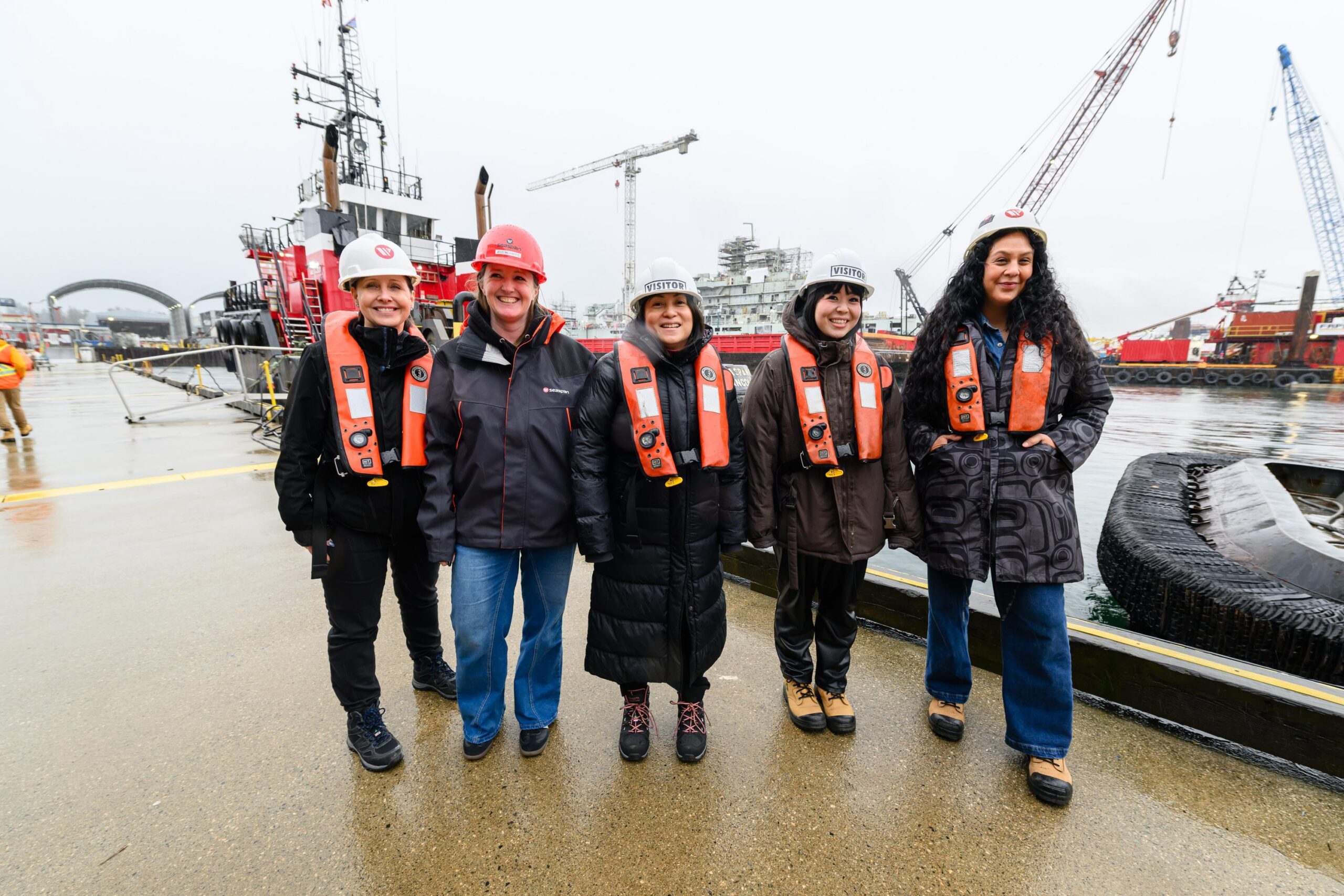March 28, 2025
When Captain Lori Tribbeck spoke at the recent Women in Marine event earlier this month, she had plenty of experience to draw upon. Lori has been in the marine industry for 28 years now, working her way up the ranks with BC Ferries to eventually become the Senior Master of the Northern Adventure.
Yet, even after all those years at sea, one story stood out to her. In her first year as a captain, she was walking up to her ship with a male coworker, when a little girl walked up to them. After asking whether Lori’s coworker was the captain of the ship, she was shocked to find out that it was actually Lori.
“This little girl’s eyes go so wide, and she says, ‘You’re a lady captain?’ I realized at this point that this little girl didn’t even know she could be a captain,” said Lori. “She had no idea that it was a possibility for her.”
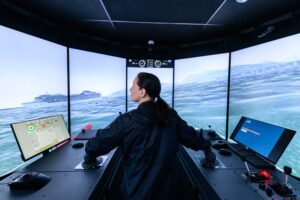
Moments like this are exactly why Seaspan was proud to host this year’s “Women in Marine” event, the second of its kind that Seaspan has organized over the past few years. On March 12, Seaspan Marine and other partners in the field who see the need for greater diversity in the industry came together to facilitate this event as part of an effort to increase women’s representation at sea.
To start off the day, we invited a wide range of participants to tour the Seaspan Marine building. The women had the chance to talk to various teams, such as tugboat dispatch and marine operations, take a walk down onto the docks and onto the tugboats for a guided tour, and finally to test out our state-of-the-art tugboat simulators.
Through these experiences, participants were able to learn how the industry operates, ask questions, and gain some hands-on experience driving a tugboat in various kinds of simulated weather conditions. For event participant Nicole Forrester, the simulator stood out as a particular highlight of the day.
“I love watching the tugboats go down the Fraser River, so it was really cool to be part of this experience,” she said. “It was really exceptional — you can see why something like this assists Seaspan in training some great people.”
After a day of tours with several groups, the second portion of the event began – a reception at the Polygon Gallery in North Vancouver, where guests would get the opportunity to network with like-minded individuals across the marine industry, and hear from a panel of speakers with lived experiences to share about being a woman in the sector.
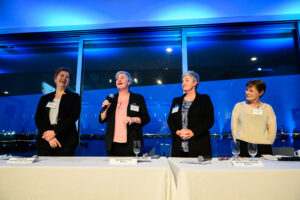
All of this is being done to increase diversity and drive positive change in a space where it is sorely needed. Across the marine industry, women make up less than 5% of the total workforce — a stunning disparity upheld by both gendered bias and structural barriers.
These numbers matter, particularly for women already working at sea. It can be isolating with few others in the field, and, both literally and figuratively, in a workspace not built with them in mind. Most in-use tugboats were designed with shared bathrooms and living spaces, leaving women onboard with little to no privacy.
This exclusion of women shows up in more than just antiquated ship design, however. It’s also an issue of culture. Both subtle and blatant discriminatory attitudes against women in the field are unfortunately far too common.
This is something that Jodi Gaudet, a Senior Chief Engineer for BC Ferries, unfortunately had to become familiar with.
“I did my pre-apprenticeship in electrical mechanics,” she said. “I did all my marine engineering duties. I did everything. Then, the manager of HR told me that, as long as he was a manager, I would never see the inside of an engine room.”
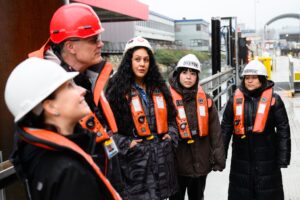
Whatever skills Jodi had, however qualified she was — none of it mattered. This is the experience of many women. Instead of being judged for what she could bring to the role, she was viewed only through the lens of her gender.
“Being seen as an engineer and not a woman has been the biggest challenge for me,” said Jodi. “Somebody once said to me, ‘You seem to be a good engineer — for a woman.’”
These harmful perceptions place pressure on women in the field, in more ways than one. Facing the isolation of being the only woman in nearly every space you inhabit, combined with an erasure of your skills and exclusion from positions of power — it can be easy to conform to the system holding you back. It’s an inaccurate assumption that, as a woman, you need to change to fit the industry, not the other way around.
For Kamila Calko, the founder of SeaLight, an organization pushing for gender equality in the marine industry, that pressure to change who she was felt strongly when she first worked at sea.
“It was gritty, rough and tumble — lots of swearing,” she said. So, I figured the only way to survive and fit in was to adopt some of those behaviours and become very unfeminine.”
If being isolated as a woman in a large group of men pushes some to conform to a masculine standard, the ironic flip side is that, as one of the only women on board, there’s also a pressure to stand out.
“I thought I had to represent all women,” said Kamila. “What that meant for me was doing all those jobs — from tugboats to skippering a fish packer, captaining a Coast Guard ship, doing four different BC Ferries rides — so that when I got there, no one could question it.”
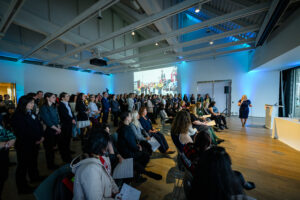
After all, as a woman at sea, you are likely the only representation of your gender onboard. It’s hard not to feel like the weight of that falls solely on your shoulders. These contradictory pressures — the pressure to conform to masculinity while somehow also standing out as a positive model of femininity — it all derives from an unfair expectation that women must prove they belong in the industry.
“It is a product of a system outside of us,” said Kamila. “That pressure to be this all-encompassing woman that can do everything, because, if you aren’t, it just might reflect poorly on the rest of us.”
Yet, the tides are changing. As many older mariners retire, there are opportunities for the industry to evolve, as Hailey McIntyre, the first female captain in the Port of Prince Rupert, explains.
“As the marine industry moves towards a massive labour shortage in the next few years, these companies are in a great position to recruit and retain skilled workers,” she said.
This shortage leaves room to change the culture of the industry. However, this isn’t an easy task. Before more women can be brought into the field, it must change from within, fostering inclusive spaces that are welcoming to everyone. To Kamila, this starts with disregarding conformity and embracing sincerity.
“It’s the power of authenticity. It’s giving us permission to be ourselves — how safe that can make us feel.” she said. “No matter where you are, how little or how much experience you might have, you have the power to influence the people around you, the culture around you.”
“Don’t forget your power.”
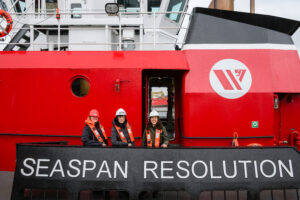
As women in the industry, embracing authenticity serves as an example to others that they, and all their unique qualities, are welcome.
“There’s not as many of us in this industry as there are men,” said Lori. “So, when we can get women in leadership positions — we’re giving the next generation something to look at and say ‘Hey, you know what? I can be a Captain. I can be a CEO.’”
Examples of the female leadership Lori highlights can be found in those who spoke during the event, using their platform to confidently and courageously stand out against a culture of conformity.
As these women shared their experiences — speaking on their hardships, but perhaps more importantly, celebrating their triumphs — they shared an essential message with the other women in the crowd. If you want to work in the marine industry, there is a place for you. You can do it.
Or, as Tuba Akar, a current BCIT instructor and the first female ship pilot in Turkey, put it:
“You do not need to prove yourself. You do not need to work twice as hard because you’re a woman. You’ll prove yourself by being competent, prepared, professional, just like anyone else,” she said.
“Always remember, the sea does not see gender — only skills.”
